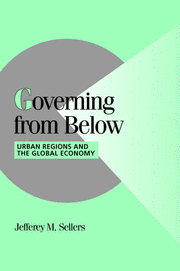4 - GOVERNING WITHIN URBAN REGIONS
Published online by Cambridge University Press: 14 January 2010
Summary
In the multilevel governance of contemporary urban regions, the urban contexts themselves amount to much more than ground zero. Even the intendants of Louis XIV, the prefects of Napoleon or the Gauleiter of Nazi Germany, when they sought to address the conditions of specific cities, often found themselves at the mercy of local politics, markets and social conditions. In the advanced industrial countries of today, efforts within urban regions to mobilize and manage these conditions have acquired new status and importance. Beyond legal mandates, monetary incentives, institutional supports and formal devolution from above, accumulating initiatives from below compel this urban governance. In Europe and North America, it transcends differences between national states and economies. For every dynamic American mayor like Richard Lee in New Haven, counterparts like Edmond Hervé in Rennes or Rolf Böhme in Freiburg have asserted parallel prerogatives. Within the service centers of advanced industrial societies, parallel political formations have emerged to contest this governance, and sometimes to cooperate. On one side stand coalitions of liberal groups and minorities in the United States, Social Democrats and Greens in Germany and Socialists and other Left parties in France. On the other belong conservative and centrist political groups often linked to business interests. Increasingly, local entrepreneurs have built regimes of governance outward from central cities into urban regions.
Not only local and supralocal initiatives but also an increasingly international diffusion of ideas among localities has fostered this proliferation of local policy. The protagonists of urban governance within urban regions, however, face not only the diverse supralocal policies outlined in the preceding chapter but an array of other conditions.
- Type
- Chapter
- Information
- Governing from BelowUrban Regions and the Global Economy, pp. 178 - 289Publisher: Cambridge University PressPrint publication year: 2002

